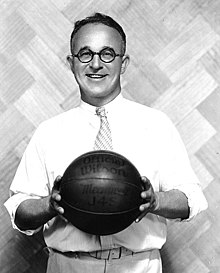This article needs additional citations for verification. (May 2015) |
 University of Wisconsin photo | |
| Biographical details | |
|---|---|
| Born | 26 January 1884 Leeds, England |
| Died | 2 December 1953 (aged 69) Madison, Wisconsin, U.S. |
| Coaching career (HC unless noted) | |
| 1911–1917 | Wisconsin |
| 1917–1918 | Missouri |
| 1919–1920 | Missouri |
| 1920–1934 | Wisconsin |
| Administrative career (AD unless noted) | |
| 1919–1920 | Missouri |
| 1933–1935 | Wisconsin |
| Head coaching record | |
| Overall | 280–101 |
| Accomplishments and honors | |
| Championships | |
| 3 Helms National (1912, 1914, 1916) 3 Premo-Porretta National (1912, 1914, 1916) 2 MVC (1918, 1920) 8 Western Conference / Big Ten (1912–1914, 1916, 1921, 1923, 1924, 1929) | |
| Basketball Hall of Fame Inducted in 1959 (profile) | |
| College Basketball Hall of Fame Inducted in 2006 | |
Walter E. Meanwell (26 January 1884 – 2 December 1953) was an English college men's basketball coach in the 1910s, 1920s and 1930s. The Leeds, England native coached in the U.S. for the University of Wisconsin–Madison (1911–1917, 1920–1934) and the University of Missouri (1918–1920) to an overall record of 290–101.
Meanwell became the fourth basketball coach in University of Wisconsin–Madison history in 1911. After earning a doctorate degree in 1915, he was nicknamed "Doc" or "Little Doc" (due to his 5'6" frame). During World War I era, he served in the United States Army Medical Corps and became a captain. After a two-year stint at University of Missouri, Meanwell was back at Wisconsin. The Badgers won or shared four Big Ten titles under his guidance (1921, 1923–24, 1929). His 1912, 1914, and 1916 Wisconsin teams were retroactively named national champions by the Helms Athletic Foundation and the Premo-Porretta Power Poll.[1] Meanwell taught a style of game that featured short passing, crisscross dribbles and a tight zone defense. In 1934 he retired from coaching and practiced medicine in Madison, Wisconsin, until his death. He was inducted to the Naismith Memorial Basketball Hall of Fame as a coach in 1959.
- ^ ESPN, ed. (2009). ESPN College Basketball Encyclopedia: The Complete History of the Men's Game. New York, NY: ESPN Books. pp. 532–33. ISBN 978-0-345-51392-2.